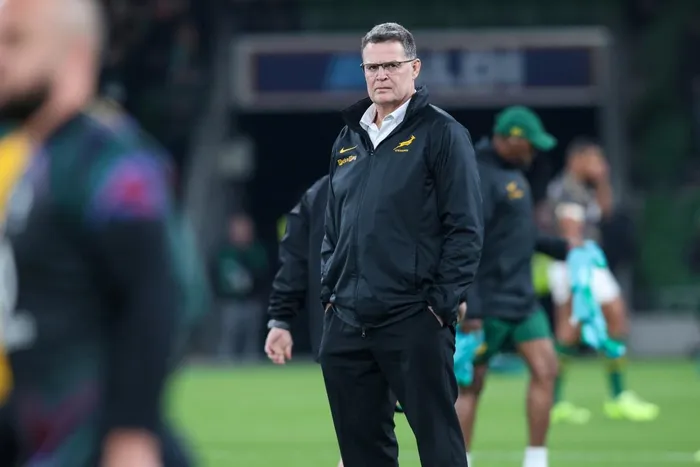
Springbok coach Rassie Erasmus praises his side’s physicality and composure after ending a 13-year drought in Dublin.
Image: AFP
Relief was the pervading emotion in the Springbok team on Saturday night after they broke their 13-year winning drought in Dublin with a 24-13 win.
The score flattered Ireland, who were dominated from the first whistle to the last, but doggedly hung in to prevent a rout.
To crown the Boks’ fourth consecutive win on their November tour, hooker Malcolm Marx was handed the World Rugby Men’s 15s Player of the Year award in the change room straight after the match.
The Boks led 19-7 at half-time and went on to win the match by 11 points, despite the clash being marred by a red and yellow card.
“It was a great win against a team that have dominated us since we’ve been together as a group,” said Erasmus, who has led this Springbok side since 2018.
“If you look back at the last five games we’ve played, they are still three–two up against us, so we won’t get carried away with the result — but the beer tastes a little better.
“We are just thankful that we were able to beat them here. It’s been a long season for us, and a lot of the players have to go back to Japan, and others will play in the United Rugby Championship next week. But we are certainly proud after such a long season to grind through a win against a team such as Ireland at home for the first time in 13 years.”
Commenting on the frantic nature of the match, with cards being handed out throughout, Erasmus and Kolisi said it was not an anomaly for the Boks, who have had to cope with red cards in their victories against France and Italy.
“We’ve had games with red cards and a concussion when there wasn’t a ping, and we’ve had to grind it out, but in general the match was very physical and there was obviously a 20-minute red card, which I thought was the correct call so that the other player could come onto the field,” said Erasmus.
“I thought we were completely dominant, but we just couldn’t capitalise while we were inside the 22m area, so it was hectic and difficult to manage with who went off and came back on. But that’s Test match rugby and you have to understand and manage those situations.”
Kolisi praised the coaches and referees for the consistent communication throughout the contest: “At half-time, we had to make plans, but we always knew what was happening, and that’s why we took the opportunities we did.
"We took the penalties and we understood they had numbers short, and the scrum was working for us, which is why we went for that aspect of the game.”
Elaborating on the scrums, Marx — who received his World Rugby award from former Springbok lock Victor Matfield — said: “It was a tough game and having that many scrums wasn’t pleasing on the neck, but they are a quality side with a quality pack, so obviously we had to grind it out and apply as much pressure as we could to get the rewards from it.
“They did extremely well in the second half to hold us out, and we had a few penalties, but they are a quality side and they showed that on the field.”
Erasmus was gracious in victory, reflecting on the match when quizzed about the physicality his charges showed.
“Ireland were just as physical to keep us out with the tackles and turnovers they made inside the 22m area, so it was physical, but I don’t think they came off second best there,” he said.
“If they scored in the last four minutes, then it would have been a restart and the game would have been on. It was definitely not a perfect performance, but there was a monkey on our backs that we had to get off.
“It also wasn’t about revenge, as people have been asking all week. It was a case of trying to fix things.”
The Springboks play Wales this week in Cardiff in their final tour match.
Related Topics: